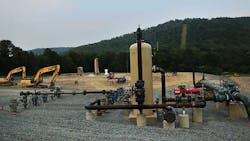EPA Says Fracking Poses No Widespread Danger to Water
WASHINGTON - The controversial oil and gas extraction technique known as fracking poses no widespread danger to U.S. drinking water, the U.S. environmental agency said Thursday in a long-awaited assessment.
Some water resources have been harmed by the practice formally called hydraulic fracturing, it said, but concluded that the risk is small compared to the number of fracking wells in use.
The evaluation from the Environmental Protection Agency delivered a broad overview of the dangers that fracking -- blasting water, sand and chemicals underground to free up and pump oil or gas -- poses to drinking water in America.
Fracking has led to a boom in the U.S. oil and gas industry, and also created many jobs in states like North Dakota.
But it has been much maligned by environmentalists who say it poses an undue threat to nature.
The study requested by Congress found that while fracking has not led to "widespread, systemic impacts on drinking water resources," there are potential dangers to some people's drinking water.
Those vulnerabilities included wastewater and "hydraulic fluids" discharged into drinking water, the report said.
"Today's study confirms what we already know. Hydraulic fracturing, when done to industry-standards, does not impact drinking water," said U.S. Senator Lisa Murkowski, a Republican who chairs the Energy and Natural Resources committee.
Republican Lamar Smith of Texas, who chairs the House of Representatives Committee on Science, Space, and Technology, also said the agency's finding Committee came as no surprise.
"As experts have testified before the Science Committee for years, there is no evidence that hydraulic fracturing has caused ground water contamination," he said in a statement.
"The EPA has spent millions of taxpayers' dollars only to conclude what state regulators have known for years," Smith said.
"After years of demonization from opponents, the administration has confirmed what we in Texas have known all along: Fracking is a safe and reliable way to take advantage of our vast domestic energy resources," said another Texas Republican, Senator John Cornyn.
Copyright Agence France-Presse, 2015
About the Author
Agence France-Presse
Copyright Agence France-Presse, 2002-2025. AFP text, photos, graphics and logos shall not be reproduced, published, broadcast, rewritten for broadcast or publication or redistributed directly or indirectly in any medium. AFP shall not be held liable for any delays, inaccuracies, errors or omissions in any AFP content, or for any actions taken in consequence.
